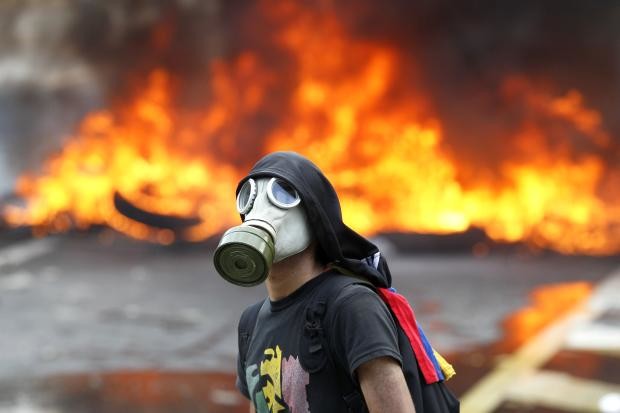
An anti-government protester stands in front of burning barricade on a highway in Caracas, Venezuela, Monday, April 24, 2017. Thousands of protesters shut down the capital city’s main highway to express their disgust with the socialist administration of President Nicolas Maduro. Protesters in least a dozen other cities also staged sit-ins as the protest movement is entering its fourth week. (Photo by ARIANA CUBILLOS / AP)
CARACAS, Venezuela — Venezuela is threatening to pull out of the Organization of American States as the socialist government’s response to political unrest that has been blamed for 26 deaths in recent weeks draws rebuke from the hemisphere’s major powers.
Foreign Minister Delcy Rodriguez said on state TV late Tuesday that she had been instructed by President Nicolas Maduro to initiate the country’s withdrawal from the Washington-based OAS if the region’s foreign ministers hold a meeting on the country’s crisis without his administration’s backing.
Her comments came hours before envoys to the OAS were scheduled to meet Wednesday to debate a proposal by Mexico, Brazil, the US and 13 other nations to convene a special meeting of foreign ministers to discuss Venezuela’s “situation.”
“We’re not going to continue allowing legal and institutional violations that are arbitrary and surpass any moral, ethical and licit boundary that nations in this regional organization should respect,” Rodriguez said.
Hundreds of thousands of Venezuelans have flooded the streets over the last month to demand an end to Maduro’s presidency. The protests have frequently ended in violent confrontations with security forces, which have used tear gas and rubber bullets to disperse crowds, and there also have clashes with pro-government groups.
The unrest shows no sign of slowing down. Another demonstration was called for midday Wednesday in which Maduro’s opponents planned to try again to march downtown to deliver a message to the nation’s ombudsman, whose job is to stand up for citizens’ rights but who the opposition has tagged the “defender of the dictator.”
Venezuela’s chief prosecutor, Luisa Ortega Diaz, on Tuesday put a spotlight on the extent of the violence, saying more than 400 people had been injured and nearly 1,300 detained since the protests began in response to a Supreme Court ruling last month that stripped the opposition-controlled congress of much of its powers.
In an unusual move, Ortega Diaz broke with the government in the immediate days after the decision to denounce it as a “rupture” of the constitutional order. The ruling was later partially reversed amid a storm of international criticism. Ever since, the prosecutor once criticized by the opposition has become an unlikely bulwark against further government repression, showing little sympathy for abuses committed by security forces and protesters alike.
“I want to express my firmest rejection to violence as an arm of political action. Politics should not lead us to war,” she said Tuesday in calling for both sides to constrain their confrontational tactics.
In the majority of cases involving detentions tied to the unrest, police have not provided sufficient information to prosecute, so those arrested would have to be freed, Ortega Diaz said.
Opposition leaders have blamed armed pro-government militias known as “colectivos” for a number of the deaths, while government officials have accused the opposition of working with criminal gangs to foment unrest.
“Right-wing terrorists have once again left Venezuelan families grieving in their continuous spiral of violence,” Interior Minister Nestor Reverol said in a nationwide broadcast.
The swell of protests is the most violent in economically struggling Venezuela since two months of anti-government demonstrations in 2014 that resulted in dozens of deaths. Maduro has called for renewed dialogue, but opposition leaders have discarded that as an option after earlier talks collapsed in December.
Amid the unrest, international pressure on Venezuela to schedule delayed regional elections and free political activists has been steadily mounting at the OAS and in other regional forum.
Rodriguez said the pressure being brought by the U.S. on some of its traditional allies like Haiti to punish Venezuela was considerable. OAS Secretary General Luis Almagro has called on the group to suspend Venezuela for breaking the constitutional order, but he has so far been unable to rally two-thirds support among the group’s 35 members to carry out such a threat.
No country has ever withdrawn from the OAS since it was created in 1948 and it’s not clear how complicated the process would be.
As a counter to the OAS gathering, Rodriguez said her government was seeking a meeting next week of another regional group — the Community of Latin American and Caribbean states, which was championed as a rival to the OAS by the late Venezuelan President Hugo Chavez. It excludes Canada and the US.
Earlier Tuesday, Maduro sang revolutionary ballads before delivering an address to supporters that didn’t tone down his combative rhetoric. He said he was willing to do whatever it took, “even give my life,” to pursue socialist policies that he said are meant to help and protect the nation’s working class.
“There is only one destiny for Venezuela,” he said. “The victory of the revolution.”
* * *
Associated Press writer Christine Armario reported from Bogota, Colombia.